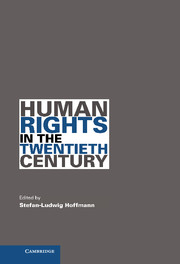Book contents
- Frontmatter
- Contents
- Notes on Contributors
- Acknowledgments
- Introduction: Genealogies of Human Rights
- Part I The Emergence of Human Rights Regimes
- Part II Postwar Universalism and Legal Theory
- Part III Human Rights, State Socialism, and Dissent
- Part IV Genocide, Humanitarianism, and the Limits of Law
- Part V Human Rights, Sovereignty, and the Global Condition
- 13 African Nationalists and Human Rights, 1940s–1970s
- 14 The International Labour Organization and the Globalization of Human Rights, 1944–1970
- 15 “Under a Magnifying Glass”
- Index
- References
14 - The International Labour Organization and the Globalization of Human Rights, 1944–1970
Published online by Cambridge University Press: 05 June 2012
- Frontmatter
- Contents
- Notes on Contributors
- Acknowledgments
- Introduction: Genealogies of Human Rights
- Part I The Emergence of Human Rights Regimes
- Part II Postwar Universalism and Legal Theory
- Part III Human Rights, State Socialism, and Dissent
- Part IV Genocide, Humanitarianism, and the Limits of Law
- Part V Human Rights, Sovereignty, and the Global Condition
- 13 African Nationalists and Human Rights, 1940s–1970s
- 14 The International Labour Organization and the Globalization of Human Rights, 1944–1970
- 15 “Under a Magnifying Glass”
- Index
- References
Summary
International Organizations and the History of Human Rights
In the spring of 1944, government, trade union, and employers’ delegates from more than forty states convened at Temple University in the heart of Philadelphia. Their objective was to lay the social foundations of a future peacetime order. Host of the gathering was the International Labour Organization (ILO), at that time the only fully functioning part of the League of Nations system. Although today largely faded into oblivion, the meeting nonetheless produced a declaration proclaiming the “right of all human beings, irrespective of race, creed, or sex” to pursue “both their material well-being and their spiritual development in conditions of freedom and dignity, of economic security, and equal opportunity.” This document may be regarded as the first official international acknowledgment of the idea of social and economic human rights. The “Declaration of Philadelphia” was an important step in elevating a new subject, universally applicable individual human rights, to the field of international diplomacy.
The prominent role played by the “global community” of international organizations in disseminating the idea of universal human rights during the twentieth century has become a generally accepted fact. Much recent literature on the international history of human rights, as well as on the history of the United Nations, points to the significant part exercised by international organizations. Battles surrounding the interpretation of human rights were fought – and a common global linguistic repertoire and moral discourse was forged – within these international organizations. Furthermore, the secretariats of international organizations (UN, UNESCO, etc.) were increasingly perceived as actors and activists in their own right within the spectrum of international human rights policy. This interest almost seems to be a natural consequence of a long-term development, as debates on human rights and their protection have shifted from national to international arenas.
- Type
- Chapter
- Information
- Human Rights in the Twentieth Century , pp. 301 - 320Publisher: Cambridge University PressPrint publication year: 2010
References
- 2
- Cited by



